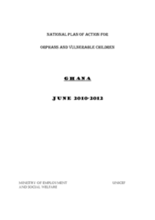Following Ghana’s ratification of the United Nations Convention on the Rights of the Child (UNCRC) in 1990, the country also initiated steps towards law reforms as an attempt to affirm its moral and legal obligation towards the survival, development and protection of Ghanaian children. National laws were harmonized with the UNCRC beginning with the 1992 Constitution which saw the inclusion of Article 28. This article guarantees the rights and freedom for children. It is also similar in terms as the principles of the UNCRC, and was followed by the passage of the progressive Children’s Act, 1998 (Act 560). As a complement to these legal frameworks, the government in 2005 developed the National Policy Guidelines on Orphans and other Children made Vulnerable by HIV/AIDS. Furthermore in 2007, a National Social Protection Strategy (NSPS) was developed to provide safety nets for the vulnerable and excluded groups including children.
The development of the three year National Plan of Action for Orphans and Vulnerable Children (OVC) was spearheaded by the Ministry of Employment and Social Welfare (MESW) together with the Ministry of Women and Children’s Affairs following a national conference on OVC in 2005 with the Support of UNICEF. It is to complement and reinforce existing legislature and other social policies for vulnerable groups. The OVC NPA framework sets out time bound goals and objectives and outlines key activities and indicators for measuring progress towards addressing vulnerabilities faced by children. It is also a framework for providing care and support to vulnerable children in care institutions. Although Government’s policies on child care emphasize a preference for family based care due to the emotional, social and development conditions of families, it however recognizes the fact that for some children, limited institutional care could be beneficial while more durable family based alternatives are worked them. Together with the National Social Protection Strategy (2007) this national plan of Action not only protects children from increased vulnerability but also reduces their risk of abuse.
The OVC NPA offers a mechanism for coordination and places the oversight responsibility for this function on the Department of Social Welfare on behalf of the Ministry of Employment and Social Welfare. The Ministry of Employment will like to encourage the District Assemblies and invite its development partners, the private sector, non-governmental organisations and community groups to build and strengthen partnerships in the implementation of this National Plan of Action. The OVC NPA should be seen as an enabling framework for which progress and success will largely depend on the collective effort of all.

